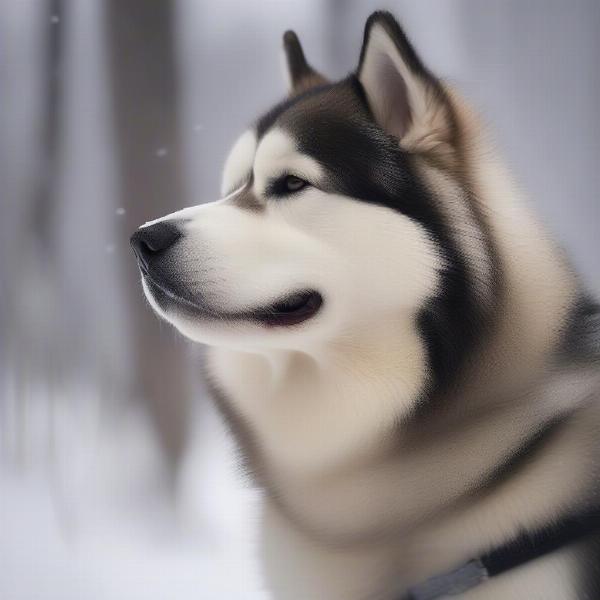The term “wolfgang dog” often leads to confusion, as there isn’t a formally recognized breed with that name. People searching for “wolfgang dog” are likely interested in dog breeds that resemble wolves in appearance or temperament. This article will explore the breeds often mistaken for a “wolfgang dog”, discuss their characteristics, and provide valuable information on their care and training. Let’s delve into the world of these captivating canines.
Decoding the “Wolfgang Dog” Myth
The allure of a “wolfgang dog” stems from the desire to own a pet that embodies the wild spirit and striking appearance of a wolf. However, it’s crucial to understand that wolves are wild animals, not domesticated pets. Their complex social structures, predatory instincts, and specialized needs make them unsuitable for typical home environments. Breeds often mistaken for a “wolfgang dog” include the Northern breeds like Siberian Huskies, Alaskan Malamutes, and Canadian Eskimo Dogs, as well as German Shepherds and Czechoslovakian Wolfdogs. These breeds often possess physical characteristics reminiscent of wolves, such as pointed ears, thick fur, and a similar build.
Exploring Wolf-Like Dog Breeds
Siberian Huskies:
Known for their striking blue or bi-colored eyes and thick double coat, Siberian Huskies are energetic and independent dogs originally bred for sledding. Their intelligence and strong-willed nature require consistent training and socialization.
Alaskan Malamutes:
Larger than Huskies, Alaskan Malamutes are powerful and loyal companions. They were bred for heavy freight hauling and possess a dignified and gentle demeanor. Their thick coats and impressive size contribute to their wolf-like appearance.
Canadian Eskimo Dogs:
One of the oldest and rarest breeds, Canadian Eskimo Dogs are highly intelligent and possess a strong prey drive. Their thick white coats and wolf-like features make them a striking breed, but their demanding nature requires experienced owners.
German Shepherds:
While not a Northern breed, German Shepherds often share physical similarities with wolves, particularly in their build and coloring. They are intelligent, loyal, and highly trainable, making them popular choices for various roles, including police and military work.
Czechoslovakian Wolfdogs:
As the name suggests, this breed is a result of crossing German Shepherds with Carpathian wolves. This unique heritage gives them a distinct wolf-like appearance and temperament. They require experienced owners who can provide consistent training and socialization.
Caring for a Wolf-Like Breed
Owning a dog that resembles a wolf comes with specific responsibilities. These breeds often possess high energy levels and require ample exercise and mental stimulation. Proper training and socialization are crucial to manage their independent nature and prevent behavioral issues.
Understanding the Commitment
“Choosing a dog breed based solely on appearance can lead to challenges down the road,” says renowned canine behaviorist, Dr. Amelia Shepherd. “It’s essential to research the breed’s temperament, exercise needs, and potential health concerns to ensure a good fit for your lifestyle.”
 Alaskan Malamute in Snowy Landscape
Alaskan Malamute in Snowy Landscape
Conclusion
While the “wolfgang dog” may not be a real breed, several dog breeds possess captivating wolf-like characteristics. Understanding their unique needs and committing to proper care and training is essential for a harmonious relationship with these remarkable companions. Choosing a dog breed requires careful consideration beyond aesthetics. Researching their specific needs will ensure a fulfilling experience for both the owner and the dog.
FAQ
- Is a wolfgang dog a real breed? No, “wolfgang dog” is not a recognized breed. It’s a term used to describe dogs resembling wolves.
- What breeds look like wolves? Siberian Huskies, Alaskan Malamutes, Canadian Eskimo Dogs, German Shepherds, and Czechoslovakian Wolfdogs often resemble wolves.
- Are wolf-like breeds good for first-time owners? Not always. Some, like Huskies and Malamutes, can be challenging due to their independent nature.
- Do wolf-like breeds require special training? Yes, consistent training and socialization are essential for these breeds.
- Where can I learn more about specific breeds? Reputable breed-specific rescue organizations and kennel clubs are excellent resources.
About ILM Dog
ILM Dog is your trusted global resource for expert dog care advice. We cover everything from breed selection and health to training and nutrition. Our mission is to provide practical, reliable information to help you provide the best possible care for your canine companion. Whether you’re a seasoned dog owner or just starting your journey, ILM Dog offers valuable resources to help you navigate every aspect of dog ownership. Contact us for expert advice: Email: [email protected], Phone: +44 20-3965-8624.